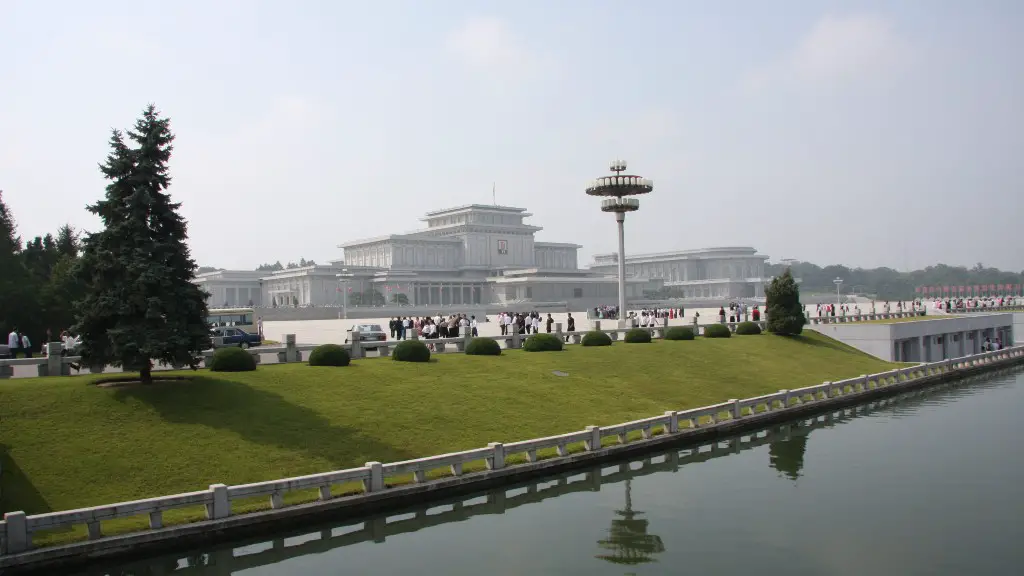North Korea’s History
North Korea is a reclusive, communist state that is located in East Asia. It is a one-party state whose official name is the Democratic People’s Republic of Korea (DPRK). It was created after the Korean peninsula had been divided along the 38th parallel in 1945, which saw the Soviet Union occupying the northern portion and the U.S. occupying the south. The two nations established their own governments and fought in the Korean War (1950-53). Since then, the governments of the DPRK and United States have had a complicated and contentious relationship.
The DPRK has maintained a policy of self-reliance since its establishment and is highly suspicious and wary of the outside world. It has a highly secretive, authoritarian regime that is often considered one of the world’s most oppressive. North Korea is almost completely isolated from the global economy and has long been one of the most heavily sanctioned countries in the world.
U.S. Sanctions
The U.S. has placed a number of sanctions on North Korea. These include financial sanctions targeting North Korea’s shipping, banking and other financial activities, as well as limits on North Korean imports and exports. The sanctions have crippled North Korea’s economy and its people suffer from poverty and lack of food. The sanctions are also in place to pressure North Korea to stop its nuclear program.
The DPRK has refused to give up its nuclear weapons, despite the severe economic impact of the sanctions and diplomatic pressure from the international community. It insists that the weapons are necessary for national security and to deter foreign intervention.
Multilateral Engagement
In recent years, multilateral engagement has become a more prominent part of the diplomatic strategy to resolve tensions between the U.S. and North Korea. In 2018, North Korean leader Kim Jong-un travelled to South Korea to meet with South Korean President Moon Jae-in in what was seen as an attempt to reduce tensions between the two countries. Furthermore, in late 2018, North Korea held talks with the United States in Singapore in the first summit between a North Korean leader and a U.S. president since the end of the Korean War.
The U.S. has largely focused its diplomatic efforts on seeking the denuclearization of North Korea. U.S. diplomats have also discussed a peace treaty that would formally end the Korean War and open the door for greater economic and diplomatic engagement between the U.S. and North Korea.
What North Korea Wants from the US
The ultimate goal of the DPRK is to ensure its national security and sovereignty and to ensure its own survival as a state. To achieve this, the DPRK wants certain concessions from the U.S., such as the removal of economic sanctions, diplomatic recognition and economic aid.
The DPRK also wants an end to the US military presence in South Korea and an assurance that the United States will not use military force against the North. North Korea wants a peace treaty that would formally end the Korean War and the normalization of relations between the two sides.
Additionally, the DPRK seeks recognition from the United States as a nuclear weapons state and the U.S. to accept its nuclear status. In return, it may be willing to make some concessions on its nuclear program, such as reducing the number of its nuclear weapons.
Compromise
Given the deep distrust between the two sides, there appears to be little chance of any agreement that would satisfy both sides. However, there may be some areas where both parties would be willing to compromise.
For example, the U.S. could offer to reduce or lift some economic sanctions in exchange for North Korea taking steps to reduce its nuclear arsenal. The U.S. could also offer to open diplomatic relations with North Korea and provide economic assistance, in exchange for a commitment from North Korea not to develop intercontinental ballistic missiles.
Diplomacy vs. Sanctions
Although most countries now believe that diplomacy and engagement are the only way to resolve the dispute with North Korea, some countries and policy makers continue to insist on a strategy of “maximum pressure”, involving economic sanctions and a military buildup in the region.
Sanctions can be effective in pressuring North Korea, but the threat of military force should not be used as an alternative to negotiations. Economic sanctions may have weakened North Korea’s economy, but they have not changed its behavior or its determination to become a nuclear power.
The Role of China
China has an important role to play in resolving the dispute between the United States and North Korea. China is North Korea’s largest trading partner, and the Chinese government has sought to use its influence to encourage North Korea to abandon its nuclear and missile programs.
However, China is loath to use economic and political pressure on North Korea, as it could destabilize the regime and lead to a refugee crisis on its border. China is also wary of U.S. military action in North Korea, as it could lead to U.S. forces on its doorstep.
The Will of the People
Ultimately, it is the North Korean people who bear the brunt of the conflict and who have the most to gain from its resolution. It is important to remember that the North Korean people are under immense pressure from the government to maintain loyalty and obedience. As a result, any agreement or understanding reached between the U.S. and North Korea must not ignore the rights and interests of the North Korean people.
Political Leadership
The difficulties of completing a successful agreement with North Korea cannot be overstated. While there is broad support for diplomacy among both the U.S. and North Korea, the unwillingness of political leaders to make bold compromises could stall any progress.
U.S. President Donald Trump has taken a more conciliatory stance towards North Korea, which has raised hopes of a breakthrough in talks. However, any agreement must be carefully planned and the details of the agreement must be made public.
Media and Propaganda
The media and propaganda within North Korea is carefully controlled and used as a tool to maintain the loyalty of its people. U.S. officials must be aware that any agreement may be greeted with suspicion and skepticism among the North Korean public.
Furthermore, North Korean media portrays the U.S. in an extremely negative light, and so any agreement will be viewed by many North Koreans as capitulation to U.S. demands. It is therefore important that any agreement reflects a genuine understanding of North Korea’s interests and red lines.
International Cooperation
Finally, it is vital that the international community works together to ensure that any agreement is adhered to and is implemented successfully. The U.S. cannot solve this conflict on its own and needs the support of the international community to ensure that all parties are held accountable.
International organizations such as the United Nations can help to ensure the agreement is monitored and ensure that the North Korean people are not penalized for their government’s actions.


